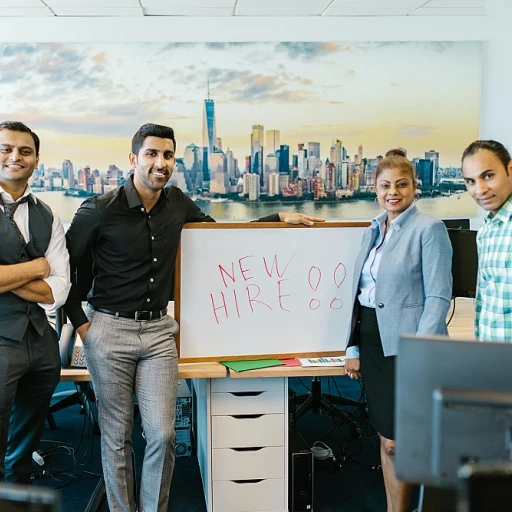
Defining Human Resources and Talent Advisors
Demarcating the Responsibilities
Understanding the roles of Human Resources and Talent Advisors is crucial in the recruitment landscape. While these two sectors often overlap, they serve distinct functions within a company’s talent management strategy. Human Resources plays a fundamental role in establishing and maintaining the organization’s employee relations, driving employer branding, and managing human resource processes like onboarding and compliance.
On the flip side, Talent Advisors focus primarily on the acquisition side of workplace dynamics. They are responsible for crafting effective candidate sourcing strategies to ensure businesses secure top talent for open roles. This involves understanding the organization’s goals, culture, and long-term vision to align talent acquisition efforts with company growth strategies.
Both roles are integral to a business’s success in filling positions with the right candidates, requiring a symbiotic relationship between talent management and operational efficiency. For companies striving to distinguish their HR functions from talent advisory, it’s important to recognize the difference between these roles and the impact they have on the organization’s overall recruitment process.
In subsequent sections, we will delve deeper into the strategies employed by these roles in the recruitment process and how technology and tools assist in streamlining candidate identification and selection. Additionally, we’ll explore the challenges both HR and Talent Advisors face and what trends are steering the future of talent acquisition.
Candidate Sourcing Strategies
Developing Effective Approaches to Talent Acquisition
When it comes to recruitment and talent acquisition, having a strong candidate sourcing strategy is crucial for any organization. Sourcing not only fills roles but is integral to the entire human resources and management strategy. Organizations must go beyond traditional methods to attract the best talent in the market.
A comprehensive strategy should incorporate various methods to tap into different talent pools. Networking, job boards, social media, and employer branding all play a vital role in attracting top talent. Furthermore, referral programs can help leverage current employees to find potential candidates efficiently. It's about creating a strong pipeline of candidates, ensuring the recruitment process runs smoothly and effectively.
Leveraging Different Platforms for Optimal Results
Using multiple platforms and channels is central to a robust sourcing strategy. Social media platforms serve as powerful tools for engaging with potential candidates, making it easier to build relationships before roles even become vacant. Additionally, maintaining a presence on professional networks and industry-specific forums can help organizations target niche talents that fit their unique needs.
Adapting to the Evolving Business Environment
Understanding the difference between traditional human resource practices and modern talent management ensures a business adapts to the ever-changing recruitment landscape. It becomes essential for businesses to align with long-term strategic goals and utilize innovative approaches within their talent management strategies. Moreover, companies often need to navigate internal changes during transformations, making continuous adaptation key to successful recruitment.
For more insight into conducting effective internal interviews within your sourcing process, refer to this resource.
Skills and Competencies Required
Nurturing Skills and Competencies for Successful Talent Sourcing
The realm of talent acquisition is ever-evolving, and to stay ahead, professionals must hone specific skills and competencies. Effective recruitment strategy requires a blend of creativity, strategic thinking, and technological savvy. First and foremost, understanding the business landscape is essential. This means staying attuned to the organization's goals and aligning the acquisition strategy with its long-term objectives. An acquisition specialist should have a comprehensive grasp of market trends and industry nuances to identify and attract top talent fitting the company’s culture and expectations. A crucial competency in talent management is excellent communication skills. The recruitment process heavily relies on building relationships, both within the organization and with potential candidates. This includes mastering employee relations and crafting compelling messaging that highlights your organization's employer branding. Furthermore, proficiency in using modern recruitment tools and technology is paramount. From leveraging social media platforms to tapping into advanced software solutions, these skills enable better management of the recruitment pipeline and enhance the efficiency of the hiring process. In addition to these technical skills, critical thinking and problem-solving are indispensable. Every hiring scenario presents unique challenges, and the ability to navigate these complexities and make informed decisions is what sets apart successful acquisition talent professionals. Finally, fostering an ongoing commitment to continuous learning is vital. The recruitment landscape is dynamic, and staying updated through training can significantly impact one’s ability to fill roles effectively. For those looking to enhance their recruitment skills, considering effective staffing training can be extremely beneficial. Cultivating these skills and competencies not only improves the recruitment process but also contributes to a holistic talent strategy that supports the organization’s broader objectives in human resource management.Technology and Tools in Recruitment
Leveraging Technology in Recruitment
In the dynamic world of talent acquisition, technology plays an indispensable role in streamlining the recruitment process and enhancing organizational effectiveness. Companies are increasingly relying on advanced tools to boost their talent management strategies, making it seamless to identify, attract, and retain top talent. With the growth of digital platforms, social media has become a powerful tool for employer branding, facilitating direct interaction with potential candidates. Platforms such as LinkedIn allow organizations to fill roles by directly engaging with potential candidates, nurturing long-term professional relationships that are essential for future workforce needs. Applicant Tracking Systems (ATS) are pivotal in managing candidate information efficiently. These systems aid companies in sorting through numerous job applications, ensuring that only the most qualified candidates proceed in the recruitment process. ATS platforms are also invaluable in maintaining a structured database of potential candidates, enabling organizations to effectively tap into their pool of existing talent. Another technological advancement reshaping recruitment is the use of data analytics. Companies are harnessing analytics to assess recruitment strategies, ensuring they align with business goals and facilitate efficient resource management. This data-driven approach helps organizations understand the difference between successful hires and shortcomings in their talent acquisition efforts. Furthermore, machine learning algorithms have started to gain traction in recruitment. These sophisticated technologies can identify patterns and predict hiring trends, allowing acquisition specialists to refine their strategies and focus on the best talent for their business needs. By embracing the right mix of technology and human resource expertise, companies are better equipped to navigate the challenges of modern talent acquisition, ensuring a proactive approach in their recruitment process and employee relations.Challenges in Candidate Sourcing
Overcoming Obstacles in Finding the Right Candidates
The landscape of talent acquisition presents its own unique challenges, especially when trying to distinguish among top talent in a highly competitive market. Organizations need to fine-tune their strategy for recruitment and talent management, striving to effectively fill roles with the best possible candidates.
- Identifying and Engaging Talent: One of the most significant hurdles is finding and connecting with the right candidates. Talent acquisition specialists are tasked with balancing the recruitment process and maintaining a pool of qualified candidates readily available for diverse roles.
- Employer Branding: Establishing a strong employer brand can make a difference between attracting or deterring potential employees. Organizations must work on their public image to appeal to candidates, making them want to learn more about the company's culture and values.
- Integration of Technology: With rapidly evolving technology, human resource departments are challenged to incorporate new tools and platforms to streamline their hiring processes. As in earlier sections, the effective use of technology is crucial for sourcing strategies, providing better insights and efficiencies.
- Long-Term Strategy Development: Balancing immediate hiring needs with a long-term talent strategy is often complex. Companies must develop forward-thinking approaches to align with their recruitment goals and stay ahead in the acquisition talent landscape.
By understanding these challenges, organizations can enhance their human resource management and improve their strategy for talent management, leading to more effective and successful recruitment outcomes.
Future Trends in Talent Acquisition
Emerging Trends in Talent Acquisition
In the rapidly evolving landscape of talent acquisition, staying ahead of trends is crucial for organizations aiming to attract and retain top talent. As we look to the future, several key trends are shaping the way companies approach recruitment and talent management.
Emphasis on Employer Branding
Employer branding is becoming increasingly important in the recruitment process. Companies are focusing on building a strong brand image to attract potential candidates. This involves showcasing company culture, values, and employee experiences through various channels, including social media. A strong employer brand not only attracts candidates but also helps in retaining employees by fostering a sense of belonging and pride.
Leveraging Technology and AI
Technology continues to revolutionize the recruitment process. Artificial intelligence (AI) and machine learning are being integrated into recruitment strategies to streamline candidate sourcing and improve efficiency. These technologies help in identifying the best talent by analyzing vast amounts of data, thus reducing the time and resources spent on the hiring process.
Focus on Diversity and Inclusion
Diversity and inclusion are no longer just buzzwords; they are essential components of a successful talent strategy. Organizations are implementing policies and practices to ensure a diverse workforce, which enhances creativity and innovation. This trend is driving companies to adopt more inclusive recruitment practices and to focus on creating an environment where all employees feel valued and respected.
Remote Work and Flexible Arrangements
The shift towards remote work and flexible job arrangements is another trend that is here to stay. Companies are recognizing the benefits of offering flexible work options to attract a wider pool of candidates. This approach not only helps in filling roles quickly but also supports long-term employee satisfaction and retention.
Data-Driven Decision Making
Data analytics is playing a pivotal role in talent acquisition. Organizations are using data to make informed decisions about their recruitment strategies. By analyzing trends and patterns, companies can optimize their hiring processes, identify skills gaps, and develop targeted strategies to attract the best talent.
As these trends continue to evolve, organizations must adapt their talent acquisition strategies to remain competitive. By embracing these changes, companies can ensure they are well-positioned to attract and retain the best talent in the market.













